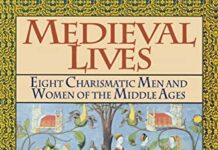
Ebook Info
- Published: 2002
- Number of pages: 272 pages
- Format: PDF
- File Size: 4.61 MB
- Authors: Norman F. Cantor
Description
The Black Death was the fourteenth century’s equivalent of a nuclear war. It wiped out one-third of Europe’s population, takingmillion lives. And yet, most of what we know about it is wrong. The details of the Plague etched in the minds of terrified schoolchildren — the hideous black welts, the high fever, and the awful end by respiratory failure — are more or less accurate. But what the Plague really was and how it made history remain shrouded in a haze of myths.Now, Norman Cantor, the premier historian of the Middle Ages, draws together the most recent scientific discoveries and groundbreaking historical research to pierce the mist and tell the story of the Black Death as a gripping, intimate narrative.
User’s Reviews
Editorial Reviews: Review “Cantor illuminates intricate connections [that] allter the course of culture, religion, war, and peace in incalculable ways.” (Boston Globe)”A most accessible, fascinating resource for high-school world history studies.” (Booklist)”Historian Cantor pull[s] together existing scholarship on the subject and provide a wide-ranging overview.” (The New York Times Book of the Times)”The best book on the Black Death….” (Felipe Fernandez-Armesto, University of Oxford, and author of Millennium: A History of the Last Thousand Years)”…impressionsitic and interesting….” (The Washington Post)”[Cantor] sounds the depths of medieval history for truths that are always relevant to our times.” (Anne Rice)”[Cantor] makes a particularly compelling case.” (Publishers Weekly) About the Author Norman F. Cantor was Emeritus Professor of History, Sociology, and Comparative Literature at New York University. His many books include In the Wake of the Plague, Inventing the Middle Ages, and The Civilization of the Middle Ages, the most widely read narrative of the Middle Ages in the English language. He died in 2004.
Reviews from Amazon users which were colected at the time this book was published on the website:
⭐I must stand athwart this chorus of negativity and yell – STOP – THIS IS A VERY GOOD BOOK. I get the impression that the first few reviewers had some animosity toward the author, panned the book and then subsequent reviewers parroted their disparagement. From some of the remarks, I had to ask myself if I could possibly have read the same book as these guys – but I did (twice) and I loved it. And I am not a stranger to Professor Cantor, Barbara Tuchman (who the book cites as a source), the Middle Ages or critical review. Please forgive me if I must respond to these at these criticisms at some length.First, Professor Cantor was a Rhodes Scholar. He taught history at the University of Chicago, NYU, Columbia and the University of Tel Aviv. Not shabby. But among academic historians he was considered a Tory. He was also a talented and successful popular writer. These factors do not engender warm-fuzzies among envious campus curmudgeons and may contribute to the animosity toward this book. This was a late work of a most accomplished man accustomed to writing as a stream of consciousness; he was pouring his inestimable knowledge of history on the pages in a race against time (of which he had little left). So I agree that the editing could have been a bit tighter (hence four not five stars).But if it is somewhat a stream of consciousness it is still neither convoluted nor full of isolated tidbits; its organization is quite obvious. The effects of the plague on European society were multifaceted and Professor Cantor examines each of those facets – the effects on the royal families (particularly that of Edward III and his son John of Gaunt), the Hundred Years War, the serfs (and indeed the end of serfdom), agricultural practices, commerce and economy. He shows how the plague greatly increased the power and influence of women while at the same time devastating the clergy and weakening the Church. This diminution of the Church contributed to the coming Reformation. And he shows how the effects of the plague are with us today. The natural selection process of the plague now protects many folks of white European ancestry from HIV infection due to a mutation in a particular cell surface antigen that is necessary to the acquisition of both diseases.And no, there were not many “thoughtful nobles” in the 14th century. During that the very height of chivalric feudalism, the nobility was far too busy observing mass, having promiscuous sex and killing each other to ponder much of anything but their salvation and their next conquest. Besides, there was little left to them to ponder. In this era before the printing press, books were rare and expensive. Higher thinking was dominated by the Thomist synthesis of Aristotelian scholasticism and Catholic theology. Anything that strayed from this was heresy worthy of capital castigation. The class system was rigid. Ignorance, prejudice and piety rendered this society suffering the plague completely incapable of responding to it effectively and that is part of Professor Cantor’s message.Nor is the book disjointed or difficult to follow if one has some acquaintance with the age. This is not a text for a freshman course in Medieval History. It is a sophisticated study that presumes the reader actually knows who the 1st Duke of Lancaster was and grasps his historical importance. Many of the primary sources for this book are academic and hitherto unreported in the popular literature. They include correspondences, inventories and official communiqués all named in the text and all catalogued in a ten page critical bibliography. Thus, Professor Cantor’s judgments and assessments are well founded and well cited. The chapter on the effects of the plague on European Jews, far from blaming them, is entirely sympathetic, clearly demonstrating how they were brutally blamed for the plague due to superstition, fear and hatred with comments on how this mistreatment echoed down the future.The section on a posited correlation between the plague and anthrax is fascinating but it does demonstrate Professor Cantor’s lack of expertise in some scientific aspects of “biomedical disaster” (a term he uses a bit to distraction, I think accounting for the accusation of repetition). Anthrax is not spread easily as an airborne contagion nor by flea bites but by direct ingestion of spores. Outbreaks would have been small and localized (and terrifying). But the hypothesis has noteworthy support in the scientific community and Dr. Cantor does an able and engaging job of presenting it as he does the hypothesis that the disease was brought by a space borne swarm of bacteria descending on the Earth. This Andromeda theory is not widely embraced in the scientific community but Professor Cantor presents it in an interesting and dispassionate narrative. These accounts are further evidence that Professor Cantor was attempting to look at the plague from all possible angles.And he succeeded. So I reiterate, THIS IS A VERY GOOD BOOK. Read it. But you may wish to read Professor Cantor’s earlier book “The Civilization of the Middle Ages” first so you might better understand this one.
⭐Early in the book, the author asserts unproved historical rumor as fact, so it tainted the whole book for me. Interesting, but speculation at best. Take it with a grain of salt.
⭐Saw this book at a bed and breakfast. Started reading and decided to order in order to finish. Good book if you like history!
⭐AP World History ReviewI would recommend this book to any researcher or student interested in this subject of history. This book gives an extensive point of view on the people who actually lived during the time of the Plague, the mid-1300’s . The book “In the Wake of the Plague” tells you how people reacted to the plague and what they did. Some people started to blame their religion and converted to another one and others look at the scientific side of it by using their knowledge and the knowledge of philosophers.What this book needs is more broad examples of cause and effect of the Black Plague. For example; how did it spread so fast, were there people to blame for it and how did it change the world we live in today. Besides not having any broad examples this was an amazing book that I would fully recommend.
⭐Lately I have read several books on the plague, of which this is the third, and it is not only the least interesting and informative of the three but is so poorly written/edited that it would surely get no better than a “C” for a college-bound high school senior’s paper. The author lacks even basic paragraph sense, invariably ending paragraphs with a sentence that seems out of the blue and that often runs counter to the rest of the paragraph. Then there are the paragraphs like this, quoted in full here: “It is possible that popular belief that Jews were responsible for the Black Death in France and Germany was inspired or at least exacerbated by a visibly lower incidence of the plague among Jews.”That’s it, entire paragraph — and end of this possibly important subject, if true, and on to something else entirely in the next paragraph. (See p.162). Look at this one-sentence paragraph for a moment and consider that it does not actually give an iota of information. It merely states that, were there to have been such a lower incidence, one might so speculate. It does not even actually convey that in fact there was “a visibly lower incidence.” Was there? This sentence/paragraph implies it but does not tell us so. It actually tells us nothing. There is also, as someone else noted, a repetition problem — the quite frequent repetition of the exact same information two pages away from the first telling, making you wonder if you reread the same page twice while dozing. Who edited this book? In complete contrast, The Great Mortality by John Kelly is as great as this was poor. If you want to read an informative, well-written, and downright “good read” on the subject, get this book. Absolutely superbly written and filled with context, bigger pictures, and details of what was going on at the time. In the Wake of the Plague is a cheap quickie by comparison.
⭐I had forgotten how utterly plodding this book was! This was my second reading of it! I’m afraid I had to skip pages of boring detail about families etc. It isn’t easy to get into and often very disjointed, skip from one century to another. There needs to be a timeline, it is confusing, unless of course you are a history scholar!
⭐Hi there at Amazon this book should be in every book lovers libruary it would make us all appreciate how easy life is today kind regards John Clifford
⭐Very interesting. Very very interesting. Especially if you admire the plague.
⭐Excellent book in optimal conditions
⭐Ich lese das Buch im Jahr 2020.Heute wurden einige Ansichten schon widerlegt (vor allem im medizinischen Bereich). Mich stört auch der übertrieben wertende Ton des Buches, was es leider nicht besser macht als ein populärwissenschaftliches Werk. Immerhin unterhaltsam.
⭐
Keywords
Free Download In the Wake of the Plague: The Black Death and the World It Made in PDF format
In the Wake of the Plague: The Black Death and the World It Made PDF Free Download
Download In the Wake of the Plague: The Black Death and the World It Made 2002 PDF Free
In the Wake of the Plague: The Black Death and the World It Made 2002 PDF Free Download
Download In the Wake of the Plague: The Black Death and the World It Made PDF
Free Download Ebook In the Wake of the Plague: The Black Death and the World It Made



